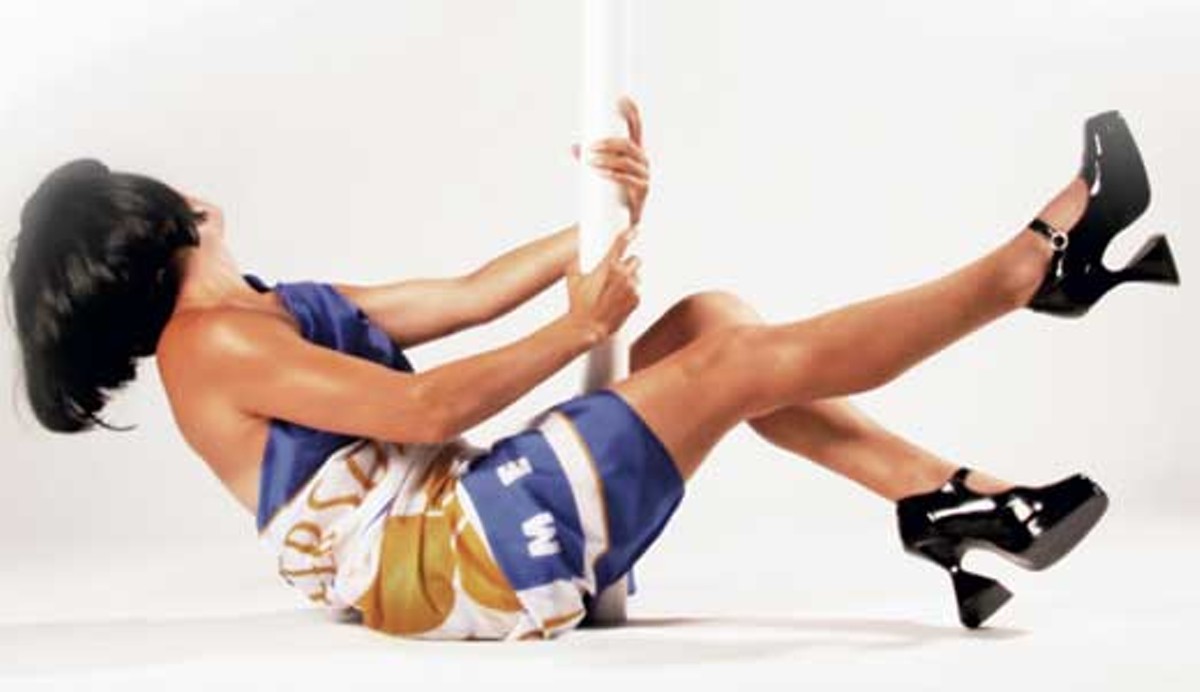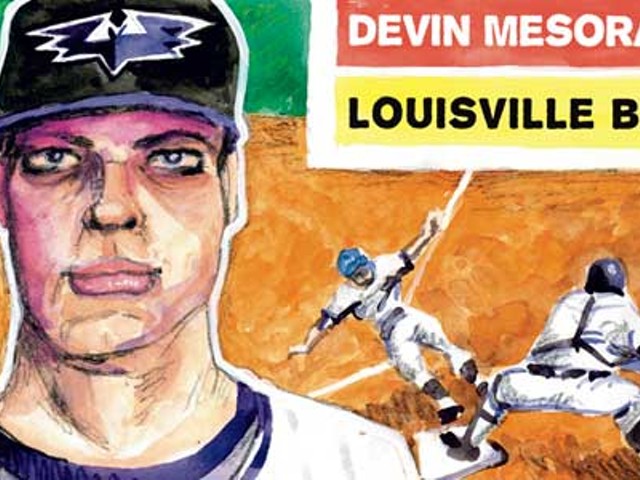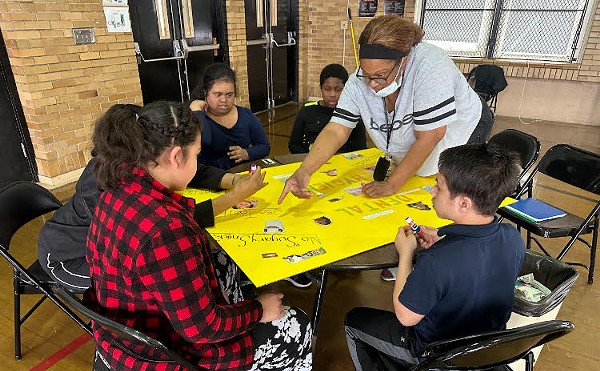Inside the dark, cool confines of P.T.’s Showclub in downtown Louisville, the atmosphere is subdued despite the loud music, a track from OutKast’s “Stankonia” blasting from hidden speakers. It’s not even 8 p.m. yet, so there’s only one active stage at the moment, upon which dancers take turns, rotating out every two songs, one after another, performing for what appears to be just a few dollar bill-holding oglers in the otherwise empty club.
A handful of patrons lean against the bar, flanked on both sides by murals of a topless woman reminiscent of Patrick Nagel paintings, their backs to the stage, as a waitress circulates around them and into the pit where she attends to the needs of six middle-aged men and a few women sitting at a table, haphazardly watching the action onstage: A young woman gyrating to the pulsing rhythms of the music, writhing on her back, her legs scissoring in time with the beat.
Wearing high-heeled pumps, an orange G-string and two glittering, starburst-shaped pasties, the dancer’s censored outfit is the new standard for strip clubs across Metro Louisville; gone are birthday suits of yore, the result of clubs’ compliance with the city’s adult entertainment ordinance, enacted earlier this year.
As enforcement began in February after the U.S. Supreme Court declined to review the case brought by more than two dozen adult businesses against Metro government — thus prompting the Kentucky Supreme Court to unanimously rule that the ordinance is constitutionally sound — the law effectively designated strip clubs and book stores selling pornographic materials as “adult-entertainment” venues. The effect subjected such businesses to a host of new regulations prohibiting (among other things) nudity, lap dances and the service of alcohol. The ordinance also restricts customers from directly tipping dancers by placing bills underneath taut thongs or frilled garters, and stipulates where those businesses can and cannot be located.
But opponents argue the ordinance — originally intended to rid neighborhoods of the crime that supposedly follows such business and to make those communities more “family friendly” — threatens hundreds of good paying jobs, from club bartenders to cab drivers to the dancers themselves, at a time when the city can ill afford to lose any more.
In 2003, the same year that city and county governments merged, the newly formed Louisville Metro Council set its wheels in motion toward figuring out what to do about the adult-themed businesses throughout the city. Prior to merger, various attempts had been made to regulate strip clubs, but state and federal judges routinely ruled that Jefferson County could not regulate those activities on First Amendment grounds.
Originally the brain child of Madonna Flood, D-24, Bob Henderson, D-14, and then-council members Julie Raque Adams, R-18, and Hal Heiner, R-19, the initial, more comprehensive ordinance aimed to, in Flood’s words, perpetuate “a fight to protect residents who have struggled to build their neighborhoods and communities.”
Their reasoning was simple: Strip clubs supposedly attract undesirable elements predisposed to vagrancy and other criminal activity, thus lowering the quality of life and, they argued, the property value of the homes in districts housing such businesses. Thus, in order to assert this moral rectitude and preserve real estate in a legal sense, limits were to be placed on the activities that occur within the clubs, including a 6-foot buffer zone between dancer and patron, no direct tipping of dancers, prohibition of the sale of alcohol, requiring dancers to acquire licenses, mandating that dancers wear at a minimum G-strings and pasties, and limiting clubs’ hours of operation.
By January 2004, the bipartisan ordinance was introduced to the full council just one week prior to their filing for re-election. The so-called “super ordinance,” in Henderson’s words, not only featured broader language, including limitations on the content of billboard advertising for adult-oriented businesses, but also included a bizarre provision, proposed by then-Councilman Doug Hawkins, R-25, which would have banned the “dispersion of human or animal saliva, urine, semen, blood or feces” in adult entertainment-themed businesses.
Immediately, adult bookstores and strip clubs mounted a legal challenge questioning the constitutionality of the law, with one lawyer representing two adult bookstores involved in the initial action, attorney Mike Hatzell, opining whether Hawkins intended to create a crack squad of semen police to enforce the measure. (As of yet, no specially designated semen-detection unit exists.)
Just days after enforcement began on the original ordinance, on March 5, 2004, then-Jefferson Circuit Judge Stephen Ryan issued a temporary injunction blocking the new law after the county attorney’s office failed to file a petition that would have effectively eliminated the circuit court’s jurisdiction over what they argued was a federal First Amendment issue, and nude dancing returned to the city unabated. The county attorney’s office also argued that lawyers for adult businesses filed suit in state-level courts as a stalling tactic, asserting that once the case was brought to higher courts, they would achieve victory.
When the case finally did land in federal court, however, the city didn’t get what it had hoped for: U.S. District Judge John G. Heyburn II allowed Ryan’s injunction to stand, with one exception — that such businesses cannot be located within 500 feet of homes, schools, parks or churches. The setback returned Metro Council to square one, and, led by Councilman Dan Johnson, D-21, they began drafting a new, scaled-down version that would not, at least in the eyes of federal judges, so flagrantly violate First Amendment-protected freedoms of speech and self-expression.
But the business’ victory was short-lived. By mid-December, Judge Ryan overturned his earlier injunction, stating that a dancer’s right to freedom of expression isn’t impugned by requiring them to comply with the ordinance’s dress code.
“We’re out of business,” Pam Kinney, a waitress at 7th Street Road’s Green Light Lounge, told The Courier-Journal in a Dec. 15, 2004, story. “You can’t make any money if there is a 6-foot rule … Tips are our main money. And we make most of our money from 1 a.m. to 4 a.m. So if they enforce that and everything else, everybody is out of business.”
Attorneys for the clubs appealed, and their clients were able to post $500 bonds to the city in order to maintain business-as-usual. Over the next six years, the legal wrangling continued, making large-scale enforcement virtually impossible.
By April 2010, the case reached the Kentucky Supreme Court, which issued a final decision later that October, paving the way for full-scale enforcement.
In an Oct. 14, 2010, interview, Milford Renfrow, owner of the Foxy Lady Gentlemen’s Club, told LEO that the impending enforcement was “ridiculous.”
“Every adult I’ve talked to is in disbelief that they are legislating us out of business,” he said. “And there is no doubt about this: It will put us out of business for sure.”
LEO contacted the managers and owners of several adult clubs throughout the city, but they declined to be interviewed citing pending litigation against the city. However, many anonymously claim they have seen a marked decrease in business, and that the ordinance has definitely cut into their revenues.
Councilwoman Flood, one of the ordinance’s original architects, again stressed to reporters the legislative intent behind the law after the Kentucky Supreme Court’s ruling last year: “You have property values that depreciate, there’s crime that comes in, such as prostitution and drugs, that happen overnight. When we pass laws, we mean to enforce them and it’s to protect people in this community. And for all businesses, whether it’s adult entertainment or it’s your local department stores, there are zoning laws and those are created to protect the citizens, and that’s what our job is to do.”
In a recent interview with LEO, Flood echoes those past comments and maintains that the reasoning for creating the ordinance wasn’t to legislate morality but to respond to complaints from constituents in her district. She also cites an explosion of new adult businesses that were established shortly after the 2003 merger.
And because of the new merger laws, “We couldn’t do anything to shut them down,” she says. “I had businesses in (my district) complaining, residents all over the city were complaining because the new businesses actually sprang up against residential properties. I had complaints back then that were sent over to the police department about certain types of behavior that were happening in (the parking lots of adult entertainment businesses).”
When asked what kind of behavior, Flood says it was “lewd and illegal.”
As far as the economic effect of lost jobs and the potential dampening effect the ordinance might have on convention business, the councilwoman says no one from the Greater Louisville Convention and Visitors Bureau has contacted her to complain.
“No one has said we’ve lost a convention because we don’t have adult entertainment,” Flood says, skirting the issue of lost jobs. “All that we are asking for is that these businesses follow the existing law of the land.”
And so, the ordinance is the law of the land, no buts about it, and strip clubs — employees, owners and patrons — will seemingly just have to get used to it.
If you even casually keep up with local news (especially of the TV variety), you might easily recall a Feb. 16, 2011, story that aired on WDRB, the local FOX affiliate, featuring one of the most disheartened farmers since the Dust Bowl devastated the Bread Belt:
Thousands of farmers are in town for the annual Farm Machinery Show, and some say the ordinance is preventing them from having the vacation they planned on.
The majority of the estimated 300,000 people who will attend this year’s show are here to check out the latest equipment, but some admit they also came to check out Louisville strip clubs. Mike Lyons traveled all the way from Maryland.
“I didn’t know about it until I come here today. If I had known this, I would have stayed home,” said Lyons.
He quickly found out that as of last week, lap dances and nudity are no longer allowed in clubs … Lyons says the city’s adult entertainment was a big part of the Farm Machinery Show’s draw for him.
“All the people that come talk about it, having a good time, the night life and everything like that. Get here, and it’s a big disappointment,” said Lyons.
While the look on Lyons’ bearded face provided for some modicum of comedy, the economics of the issue — at least in terms of the ordinance’s impact on Louisville and its effect on the dancers, bouncers and bartenders who stand to lose their jobs — is no laughing matter.
Attorney Frank Mascagni III, who has represented clubs since the wrangling over the ordinance began and whose current clients include two of the city’s preeminent clubs, P.T’s and Déjà Vu, isn’t one to mince words. He claims the ordinance has irresponsibly crippled an industry during an economic recession, and that the city is missing out on millions of dollars in taxes (alcohol, sales, etc.) and potentially losing hundreds of thrill-seeking conventioneers like Lyons.
“It’s not just the titty bars,” Mascagni tells LEO. “It’s the loss of conventions coming to town. The Farmers … are never coming back to Louisville. We’re going to lose millions of dollars in convention trade, you’re going to put about 300 workers out of a job — that’s the girls, the bouncers, the bartenders, the parking attendants — we’re going to lose another million dollars in taxes on whiskey, wine and beer and bar food, and we’re going to miss a million dollars in city and county taxes.
“In this economic reality of fiscal constraint,” he adds, “the mayor’s going to (forgive) millions of dollars of tax revenue … and we’re going to put between 150 to 300 people out of work. That is my view of what’s important in terms of the economic reality of this.”
Although it’s hard to estimate how much of a hole the ordinance has cut into Louisville’s economy, the effects are already being felt by the very businesses targeted by it.
In an April 1, 2011, article, Scott Lindsay, co-owner of the Godfather chain of clubs, told Business First that in the two months after the ordinance took effect, his volume of business had already dropped 50 percent from the previous year. Similar concerns have been expressed by club owners across the spectrum of local media, although none have as yet shuttered their doors due to the sanctions.
But Mascagni is adamant that beyond the economic effects, there is an underlying morality that is being legislated, and, in a libertarian-tinged tirade, equates strip clubs with cigarettes, drinking and the pursuit of other personally chosen vices.
“Do people die from smoking cigarettes?” Mascagni asks rhetorically. “Yes. Can the government regulate the sale of cigarettes and tax it? Yes. Can you die from drinking whiskey? Yes. Can the government regulate it? Yes, but it’s still a lawful act. Are people offended by abortions? Yes. Is it immoral, depending on your point of view? Yes. But is it lawful in this country? Yes.” And then he moves in for the kill: “Are titty bars lawful in this country? Yes. Are they distasteful to some? Yes, but the bottom line is it’s lawful, so what we’re doing now is arranging chairs on a sinking ship to see what is lawful conduct and what is unlawful conduct under the ordinance … in view of decisions made by the United States Supreme Court in this First Amendment area of law.”
You don’t like strip clubs? “Then don’t go to them. It’s just that simple,” he adds.
But then we’re back to Flood & Co.’s original argument that strip clubs are a blight upon the neighborhoods in which they reside, so the question of personal choice becomes irrelevant: It’s a social problem, after all, when drugs and crime infest your block because of naked women, so libertarian concerns will only get you so far.
Except, however, for one little thing: There’s no credible evidence that empirically shows that adult movie houses or book stores or strip clubs depress real estate values.
In the case of this and other similar ordinances drafted and implemented across the nation, there is an oft-cited 1986 Supreme Court ruling, Renton v. Playtime Theatres, that serves as the basis for the ordinance’s underlying logic, and the story goes like this: The suburban town of Renton, Seattle (population 91,000), attempted to prohibit the location of a pornographic theater within 1,000 feet of residential areas, schools and churches, with the city arguing (a la Flood & Co.) that it’s presence was dragging down the home equity of the relatively affluent community.
The Supreme Court, freshly packed with Reagan-appointed justices, ruled in favor of the city. Interestingly, the dissenting opinion, authored by William J. Brennan Jr., a liberal, pointed out that there’s no basis for such claims.
“Renton has not shown that locating adult movie theaters in proximity to its churches, schools, parks, and residences will necessarily result in undesirable ‘secondary effects,’” Brennan wrote, “or that these problems could not be effectively addressed by less intrusive restrictions.”
And as for the assertion that such businesses generate crime, Louisville Metro Police officers previously suggested the opposite is true: Undercover agents told WLKY for a March 10, 2011, story that they expect prostitution and other sex-crimes to increase as a result of the stringent ordinance. As of last week, however, LMPD spokesman Dwight Mitchell indicated the department has not seen an increase in such crimes.
Although it’s unclear how many strippers would resort to such black market activity, or whether they might leave the industry altogether, a newly formed nonprofit called Scarlet Hope House wants to entice those remaining dancers to turn away from their supposed sinful ways, economics be damned, and toward eternal salvation. With a quasi-halfway house in the works for the Clifton neighborhood, the facility plans to provide food and shelter for “victims” of stripperdom as well as to “bring the Hope and Love of Jesus Christ to women and men in the adult entertainment industry,” according to the Scarlet Hope website.
“By sharing the gospel message with these women through action and words,” it continues, “we are proclaiming the name of Jesus who is their only Hope to be free from bondage.”
It remains to be seen whether any clubs will close, how many supposedly godless strippers will embrace the Christian gospel, and what, if any, net effect the ordinance will have on the Louisville economy as a whole.
But one thing is for certain: I, like a certain disgruntled farmer, will be taking my business elsewhere.






